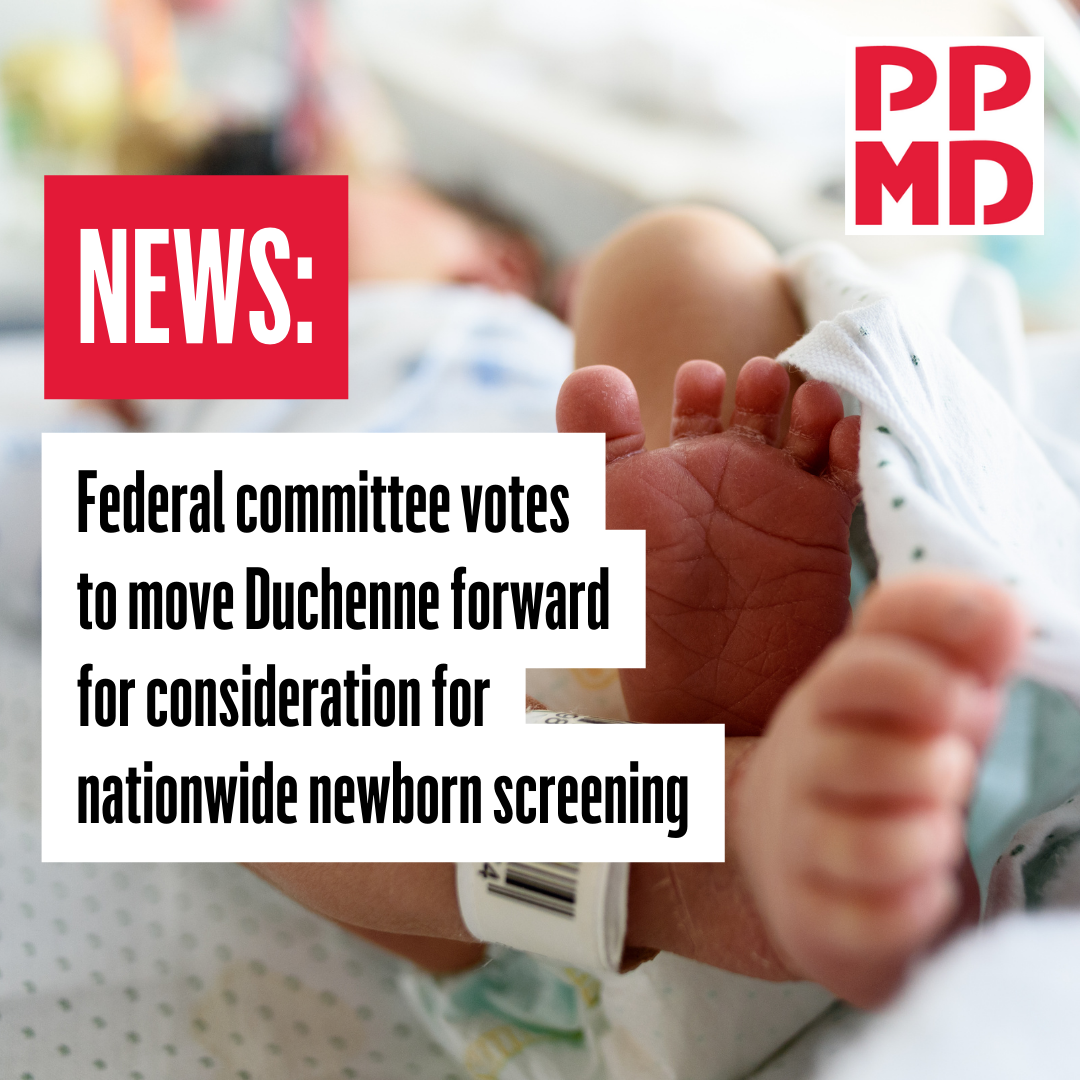
PPMD’s nomination package to add Duchenne to the Recommended Uniform Screening Panel (RUSP) passed the Advisory Committee on Heritable Disorders in Newborns and Children (ACHDNC) Nomination and Prioritization vote today! This decision marks another exciting step towards the organization’s goal of having Duchenne added to newborn screening (NBS) programs across the country, as the ACHDNC voted to move the package forward to more extensive review.
The RUSP is a list of disorders that the Secretary of the Department of Health and Human Services (HHS) recommends for states to screen as part of their NBS programs. Having a disorder be added to the RUSP shows that there is clear evidence of benefit to the babies and their families for newborn screening of that condition.
The Duchenne RUSP package was initially submitted in June of 2022. The process for adding a disease on to the RUSP is lengthy and intense, typically taking at least five years of effort to build the infrastructure and then another two years of actual ACHDNC review, with at least two ACHDNC committee votes required.
The ACHDNC analyzed the evidence presented about the benefit of NBS for Duchenne, including availability of an effective test to identify newborns, the benefit of treating young children with Duchenne, and the ability of state laboratories to do the screening. With majority approval, the ACHDNC voted to move the Duchenne package to the more extensive Evidence-based Review.
The Evidence-based Review is performed by an external group of experts that will spend approximately nine months analyzing Duchenne NBS, to better understand the impact of newborn screening for the condition. This group will present its findings back to the ACHDNC committee at each quarterly meeting. After all evidence has been presented, the ACHDNC will vote a final time. A second vote in favor of the Duchenne package would send the condition to the Secretary of HHS for final approval.
Niki Armstrong, PPMD’s Newborn Screening Program Manager, explains that Duchenne has passed the first hurdle toward being on the RUSP. Ms. Armstrong says,
“This vote in favor means that the Committee feels that additional investigation into Duchenne newborn screening is warranted. We’re thrilled to have passed this step in the review process and are actively working to support the next stage of review.”
The development of a RUSP nomination package was an intense effort led by PPMD that required reviewing and compiling evidence on all newborn screening pilots or programs and on all therapies. Multiple workgroups composed of experts in Duchenne, newborn screening, and pediatrics have contributed to these efforts over the last few years. PPMD is incredibly grateful to all the experts in Duchenne and NBS who have contributed, including the Muscular Dystrophy Association (MDA) who acted as a co-sponsor for the RUSP. The RTI Early Check DMD pilot, a pilot in North Carolina led by the nonprofit research institute RTI International with funding from the MDA and Sarepta Therapeutics, and the Brigham Women’s Hospital supplemental DMD newborn screening program in Boston with funding from CureDuchenne, have each contributed important data and expertise to this effort.
Founding President and CEO, Pat Furlong reflects on the importance of this first vote in favor of Duchenne newborn screening,
“This is a hopeful time in Duchenne therapy development. We have a robust experimental therapy pipeline targeting multiple physiological pathways, and multiple approved therapies with several currently under consideration by the FDA. Yet therapeutic interventions are likely to be optimally effective the earlier they can be offered. Newborn screening is the most effective way to ensure that infants with Duchenne are diagnosed early and equitably, such that all babies can benefit.”
PPMD has been building the infrastructure for early identification of newborns with Duchenne—including a robust therapeutic pipeline, regulatory infrastructure, and clinical care network and guidelines—since its inception and preparing for the implementation of NBS for Duchenne for almost a decade. A mandatory element of this process was the development and support of a large pilot, which was completed in October of 2021. That pilot screened more than 36,000 babies born in New York State over two years. Four babies were confirmed to have Duchenne/Becker muscular dystrophy, and one baby was identified as a carrier female.
“We are exceptionally grateful to the families, experts, and partners who have helped us to get to this point in our newborn screening efforts,” shares Ms. Furlong. “Recommendation to the RUSP will enable Duchenne newborn screening to be performed across the country, resulting in early diagnosis, early intervention, and most importantly, the best possible outcomes for these babies.”
As the Committee continues to review Duchenne for the RUSP, state specific efforts towards NBS for Duchenne are underway in selected states. Most states have additional processes to add a condition like Duchenne to their newborn screening, which may include legislation or review by a state advisory board. Ohio has already legislated that Duchenne NBS will start in 2024 for all babies born in Ohio, and several other states will likely follow.
To learn more about PPMD’s work in newborn screening, click here.
Read PPMD’s press release here.



 by: Parent Project Muscular Dystrophy
by: Parent Project Muscular Dystrophy

